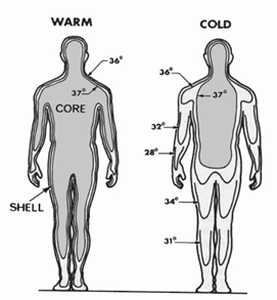

MedFriendly®


Homeothermy
Homeothermy is a form of temperature regulation in which
the body maintains the same internal body temperature
that is largely independent of outside influences (e.g.,
heat, cold). However, exposure to extreme temperatures
for prolonged periods can increase or decrease the body
temperature of a homeotherm. A homeotherm is any
animal (e.g., mammals and birds) that tends to maintain a
constant body temperature. The body temperature of a
homeotherm is often higher than its outside environment,
but this is not always the case. Homeothermy takes place
through the body’s internal metabolism.
FEATURED BOOK: Temperature Regulation in Humans and Other Mammals
Metabolism refers to the chemical actions in cells that release energy from nutrients or
use energy to create other substances. Each bodily temperature regulation system has
advantages and disadvantages. The main advantages of homeothermy are self-sufficient
temperature regulation (particularly in the cold), efficient body use (since there is
generally no need to spend extensive time warming up or cooling down), and the ability to
use specialized enzymes that function best at a near-constant temperature. An enzyme is
a type of protein that helps produce chemical reactions in the body. If body temperatures
go outside the narrow range of the homeotherm, they may decrease their activity or stop
working completely. The main disadvantage of homeothermy is that exposure to extreme
temperatures can lead to a quick death because the body’s enzymes will stop working
and metabolism slows down.
"Where Medical Information is Easy to Understand"™
A homeotherm is also known as hematherm, endotherm, and warm-blooded animal. Technically though,
there are three different types of warm-bloodedness with homeothermy being one of the three. The
opposite of homeothermy is poikilothermy, in which the internal body temperature significantly varies
(such as in frogs). Homeotherm comes from the Greek word "homoios" meaning "similar," and the Greek
word "thermos" meaning "warm." Put the words together and you get "similar warm."















